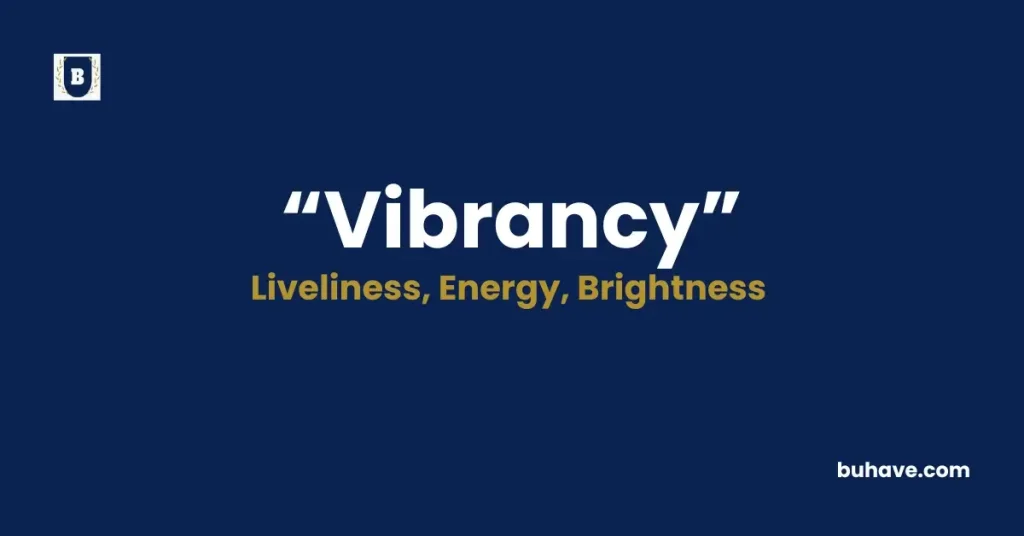The word ‘Vibrancy’ (Noun) describes the quality of being full of energy, life, and enthusiasm. In this guide, you’ll learn the full definition, synonyms, antonyms, etymology, and real-life examples of how to use ‘Vibrancy’ correctly in sentences.
Vibrancy Explained in Depth
A complete and detailed guide to the word “Vibrancy” including meaning, definition, examples, etymology, synonyms, and antonyms.
Meanings of Vibrancy
Vibrancy means to a state of being full of life, energy, and excitement. It often conveys a sense of liveliness, brightness, and dynamic movement that makes something stand out or feel alive. This quality can apply to people (someone with a vibrant personality), places (a vibrant city), colors (vibrant hues), or even experiences (a vibrant atmosphere at a festival). Essentially, vibrancy captures the spirit of something that is active, enthusiastic, and dynamic.
For example, a bustling market filled with lively sounds, bright colors, and enthusiastic vendors might be described as having vibrancy. Similarly, a person who brings positivity and enthusiasm to every conversation exudes vibrancy. This word embodies the idea of life, passion, and dynamic energy that adds beauty and excitement to the world around us.
Definition
Vibrancy is of being full of energy, brightness, and enthusiasm. It describes the dynamic, lively, and spirited nature of something or someone that captures attention and radiates positivity. When we say something has vibrancy, we mean it is vivid, energetic, and full of life, often inspiring a sense of excitement or joy.
This quality can apply to anything from a colorful painting to a lively community event, reflecting an atmosphere of activity and liveliness that makes an experience feel unforgettable and exciting.
Etymology
The word “vibrancy” comes from the root word “vibrant,” which itself derives from the Latin verb “vibrare,” meaning “to shake or quiver.” This Latin root evolved into the Middle French “vibrant,” meaning “vibrating” or “quivering.” Over time, “vibrant” came to mean full of life, energy, and enthusiasm. The suffix “-cy” was added to form the noun “vibrancy,” which denotes the quality or state of being vibrant. Essentially, the word has carried the idea of motion and energy through its historical development, emphasizing the dynamic, lively qualities that make something stand out and feel alive.
Example Sentences
- The vibrancy of the city markets was overwhelming, with colorful stalls and lively music at every corner.
- She brought a vibrancy to the office that lifted everyone’s spirits and made the days brighter.
- The painting captured the vibrancy of a summer sunrise, bursting with warm colors and energy.
Vibrancy Synonyms
- Liveliness
- Energy
- Vitality
- Animation
- Spirit
- Radiance
- Brightness
- Intensity
- Exuberance
- Vividness
Vibrancy Antonyms
- Dullness
- Monotony
- Lifelessness
- Flatness
- Drabness
- Insipidity
- Stagnation
- Weakness
- Faintness
- Blandness
FAQs about Vibrancy
Here are some frequently asked questions (FAQs) about the word “Vibrancy”
1. What does “vibrancy” actually mean?
“Vibrancy” refers to the quality of being lively, energetic, and full of enthusiasm. It’s about the dynamic nature of something that feels full of life and positive energy.
2. Can “vibrancy” describe a place or a person?
Yes, absolutely. You can describe a city, a community, or even a person as having vibrancy. For example, “The festival added a lot of vibrancy to the town,” or “Her vibrancy lit up the room.”
3. Is “vibrancy” always positive?
Generally, yes. “Vibrancy” carries a positive tone, highlighting the lively, energetic, and exciting aspects of something. It rarely has a negative connotation.
4. How is “vibrancy” different from “vibrant”?
“Vibrant” is an adjective describing the lively or energetic quality of something (e.g., “a vibrant personality”). “Vibrancy” is a noun that refers to the quality itself (e.g., “the vibrancy of the crowd”).
5. Can I use “vibrancy” in casual conversation?
Yes, definitely. It’s a versatile word that works well in both casual and formal settings. For example, “I love the vibrancy of this place” or “Her vibrancy is contagious.”

















